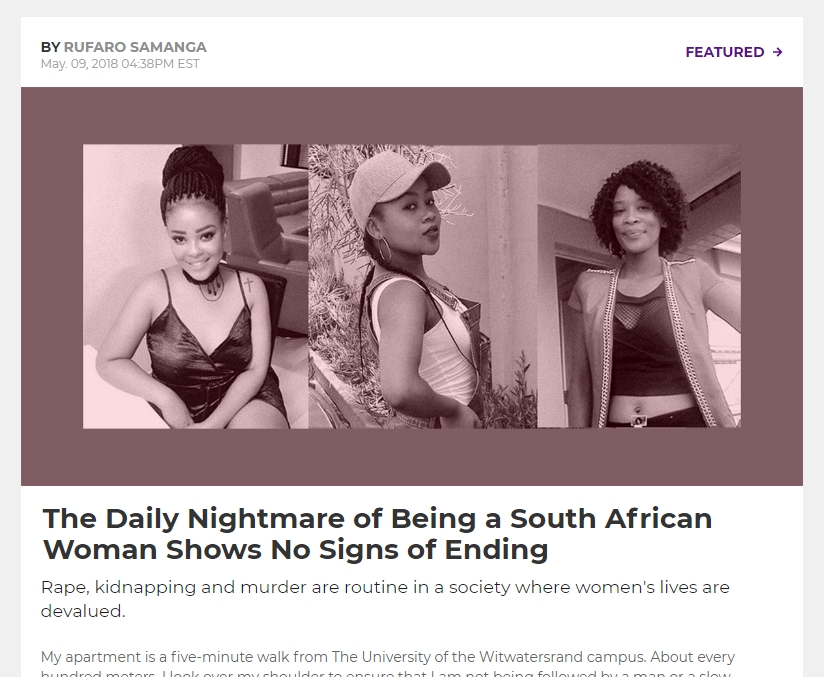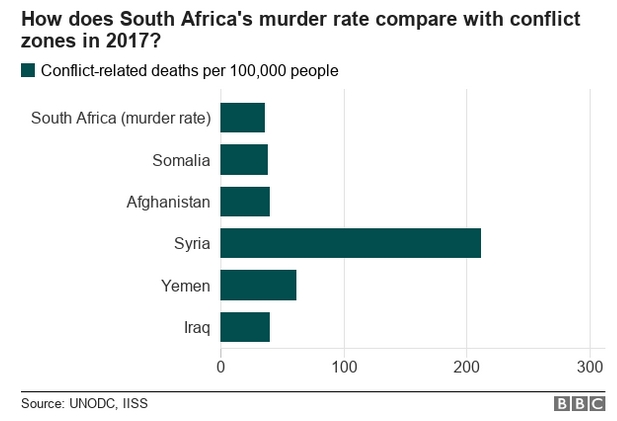When I first arrived in South Africa, just before Christmas last year, a female friend picked me up from the airport. We had met only once, three years earlier, but had stayed in touch ever since. I was happy I could stay the night at hers and leave some of my stuff there until my return from a brief trip to Germany. In the car, on our way from the airport, we were catching up, also about my four months of travelling. In this context my friend mentioned that as much as she loves travelling, it is unimaginable for her to stay in a mixed dorm. Mixed in terms of gender. She does not have enough trust in men. She is a South African woman. That was my first personal, fortunately indirect, exposure to the tragedy of women in South Africa. And I have since realized how privileged I was when my friend allowed me to stay at her house.

If you are planning to come here, you better stop reading now. What follows may sound very discouraging. Having said that, I would like to emphasize, as many in the tourism sector do, that most victims of capital crime in the country are poor, black people in rural areas. Besides, this country has a lot to recommend it, foremost of all its people. The high rate of femicide though is not part of that. Well, this post is not about you as a tourist or me, but about South African women as victims of toxic masculinity in their own country, and worse, in their own homes.
[UPDATE – as horrible as it is]
[UPDATE on UPDATE: read this – it’s all a lie]
***
https://www.facebook.com/clive.mathibe/videos/10156371276896322/
South Africa has gained a sad notoriety for its extreme crime rates in general. To give you an idea (numbers mostly from April 2016 to March 2017; source):
- murder: Germany ca 360, South Africa 19,000 (adjusting it to the size of the population, i.e. 82M : 56M, the figure for South Africa would be nearer 30,000).
- rape: SA ca 40,000 reported (Germany, again with 1.5 times the number of people: ca 11,000) – the number of unreported cases must be huge considering that 25% of SA men admit to having raped at least one woman.
- robbery (common and aggravated): SA 194,300 (Germany: ca 39,000)
- kidnapping: SA 4,100 (2013/2014), and one child goes missing every five hours (Germany?)
As for murder, the worst area is the Eastern Cape, the otherwise beautiful Transkei. In the rural areas the employment rate is 16% – yes, you read that right: those are the people with employment. The cocktail of poverty and crime makes it the second-worst region in the world when it comes to murder! (source)
[UPDATE: click here]

Since I’ve been here, hardly a day has passed without someone or other talking about a recent killing or robbery that somehow affected them. Especially my various taxi drivers would talk of the latest victim in the taxi war that’s raging in the towns (see here or here), or how their smartphone was robbed at gunpoint when they were stationary in downtown and fool enough to have the window open because of the heat. And so on …
And then there is this other “war”, as it has been called in the media, South Africa’s men’s war on women, especially in intimate relationships. The horrible facts:
In South Africa, more than 1 000 women are killed by an intimate partner each year. In fact, intimate partner femicide, which is the most serious form of domestic violence, is the leading cause of the murder of women. (source here, see also here)
Since the passive voice makes the sentence about the victims, let’s be precise and make it about those who are responsible: 1,000 South African men kill their partner every year. That means, roughly every 8 hours a man chooses to kill his girlfriend, wife, mother of their children, like this policeman who shot his wife in front of school staff …
I encounter violence committed against women in the news on a daily basis, but also – again, indirectly – in daily life. Be it the house help who tells her story of domestic violence (a story which sadly is so similar across the continent); be it the woman on the sidewalk in front of me who in broad daylight feels so uncomfortable, she keeps on glancing over her shoulder to check on me (and I tend to make sure to catch up and pass by quickly so as to shorten the period of discomfort); or the conversation last night with a well-known jazz musician whose anger about South African men was so tangible.
One of my best memories of teaching Hamlet at UJ was a discussion we had in the class room after I had ripped Hamlet to pieces for his treatment of Ophelia. One of my students, a guy in one of the back rows, raised his hand and said something like, “Surely, if a woman breaks up with a partner, she must bear the consequences of what it does to the guy”. The protest of some ladies in the front rows was immediate and powerful. In the subsequent discussion, which I picked up again in the following session some days later, we could find some agreement on how the lady is definitely allowed to choose to leave her partner, and not at all responsible for whatever change in the guy’s emotional setup this brings about. I was happy that M., the guy in the back who had started the discussion, was able to modify his earlier statement. At the time I did not quite see the full relevance of the discussion, but I see it now – a necessary discussion about toxic masculinity (a concept thankfully introduced to our discussion by another male student), about emotions and about taking responsibility. And about the femicide that is going on in this country. Women in Africa keep the continent alive in so many incredible ways, and for all their efforts suffer violence in most horrible forms on a daily basis.
Post-apartheid South Africa may have the most progressive constitution, and gender equality may be one of its proclaimed aims since 1994, however, not everyone lives up to it in a society that also embraces very conservative values, for better and for worse. Indeed, Nelson Mandela, president in 1994, emphasized more than once that “Freedom cannot be achieved unless women have been emancipated from all forms of oppression.” True, but the reality on the ground in South Africa is as removed from that aim as was Mandela’s handling of gender politics in his private life: besides stories of physical assault in his first marriage, “Mam’ Winnie ‘makes an interesting comment about this overwhelming, overpowering effect that Nelson had. She felt that you disappeared under Nelson’s dominance.’ [Anti-apartheid activist Fatima] Meer said when the two had just married, Mandela would have liked his wife to have just stayed at home. But Madikizela-Mandela always had a need to assert herself, her own rights, her own personality.” And so on … (source)
No doubt, this terrible situation must change, and calls for change have been out there a lot, notably voiced by the late Mama Winnie Madikizela-Mandela. It is one of the numerous construction sites in this country, and world wide. In a society anxious in the face of poverty and extreme crime rates you’d wish that your home was a safe haven. South African men in their hundreds and thousands, that’s the saddest bit, even make home an unsafe and fatal place to be in. After almost half a year in Jo’burg I know the value of a safe haven at home more than ever, and as much as I wish everyone here, women, children as well as men, would have such a haven, that wish almost seems futile in the face of the daily news. … I don’t know what else to do than to listen to the angry, sad voices of women here, and wherever possible, in the classroom, on social media, face to face, to speak up against and call out toxic masculinity, that sense of patriarchal entitlement which is poison to every society.
On toxic masculinity see my post on Inxeba here:
Images of homosexuality: Ayanda Mabulu and “Inxeba – The Wound”
